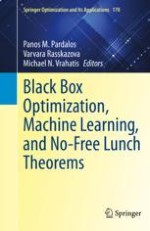2021 | OriginalPaper | Chapter
Mathematically Rigorous Global Optimization and Fuzzy Optimization
A Brief Comparison of Paradigms, Methods, Similarities, and Differences
Author : Ralph Baker Kearfott
Published in: Black Box Optimization, Machine Learning, and No-Free Lunch Theorems
Publisher: Springer International Publishing
Activate our intelligent search to find suitable subject content or patents.
Select sections of text to find matching patents with Artificial Intelligence. powered by
Select sections of text to find additional relevant content using AI-assisted search. powered by

